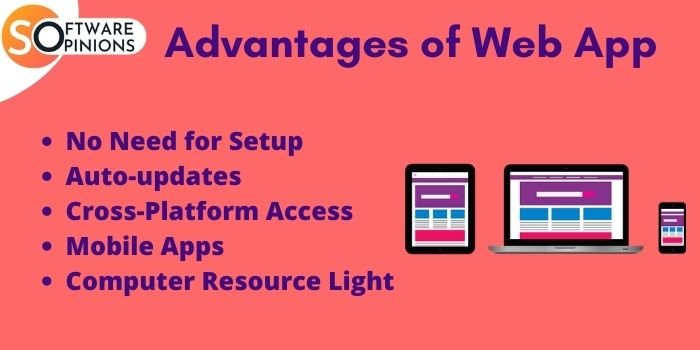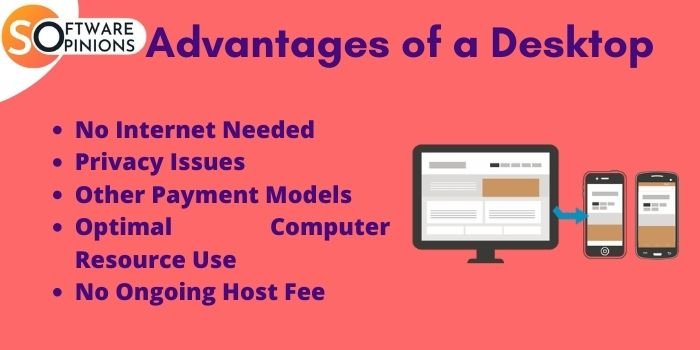Today, we will disclose the what is the difference between web vs. desktop software? which is best for business in 2023? in simple words if we see then, the desktop application is a computer program and, for the web application, we will need to run it on their personal computer. Below we have mentioned all the essential points that come with all solutions that we’re seeing on the Internet. Let’s come to the point and discuss the main topic.
Page Contents
What Is The Difference Between Web And Desktop Software?
Desktop Apps
The desktop application is the software you need to install on your computer. It can be launched independently of other programs. They take up hard disc space and function without an internet connection.
Web Apps
This sort of software is accessed using a web browser. The files are not stored on your computer but on a distant server. A web browser is used to access the app and its content and perform the scripts that make it work. Interactivity separates a static web page from a web application. In many cases, they enable you to alter data and content.
You probably use web applications daily—email, Google Docs, messengers, etc.
Both software can be used for your business. But to see which one is better for your business, you need to contact a web application development company as they tell you the best fit for your business from every aspect. We have read the difference between web and desktop software, read further to find out the advantages and disadvantages of each, Web vs. Desktop Software.
Advantages Of Web App

No Need For Setup
To run a web application, enter the correct URL. This makes using the app a breeze anytime you need it. Web vs. Desktop Software has no large files on your hard disc, and it works on any device. Some tools need a registered account to save work and additional accessibility features. But many others work straight away. In any event, online applications are instantaneous, meaning you don’t have to wait for them to download and install.
Auto-updates
Web vs. Desktop Software is inconvenient to manually download and install updates. There’s no denying it. Even if the software automatically downloads them, you must authorize, wait, and reload them. It may seem trivial, but having automatic updates and always having the newest stable version saves time.
Cross-Platform Access
Internet connectivity is required for most online apps. Web vs. Desktop Software doesn’t need particular gear or software to operate. So you may use them on any device or platform with a web browser. Because the app’s functionality is on the server, it doesn’t matter whether you start it from Windows, Mac, Linux, or another platform.
Mobile Apps
Platform independence also entails mobility. So most online apps can operate on mobile devices. The size of the screen or less accurate navigation might occasionally restrict the program’s nature and usefulness.
Computer Resource Light
Web vs. Desktop Software services uses much less processing power. Assumedly, your browser still runs on your machine, and each active tab consumes RAM. In that way, it isn’t similar to desktop applications. But not everyone has one. It’s difficult not to accomplish your work due to technological restrictions. Web apps operate the same regardless of processor price.
Advantages Of A Desktop

No Internet Needed
Despite its popularity, the internet is not yet 100% reliable. It is less available in certain areas, and many ISPs have poor connection stability. Not to add, the autonomous mode isn’t available for all online programs. But that’s a desktop’s forte. Once installed on your PC, you may use it anytime you need it, with no latency.
Privacy Issues
Desktop applications are the best option for valuable intellectual property protection. Sensitive data is better to keep on separate clouds. After all, desktop services are more secure because of almost everything you do online.
Other Payment Models
Most paid desktop programs are yours once purchased. It has no monthly fees or memberships. However, such initiatives are frequently costlier. Also, if you have several systems or require an app installed on every PC in your business, it may wind up costing a lot depending on the purchased solution.
Optimal Computer Resource Use
Desktop programs can do things online apps can’t do since they use a PC’s processing capability. For example, they max up the GPU for the newest video game or produce a 3D model. It’s a better opportunity to know about the best AI copywriting software in 2023.
No Ongoing Host Fee
This refers to bespoke software. If you create a web application, you must pay for the hosting. It may be fairly costly depending on the quantity of data it saves and analyses. Using a desktop app eliminates these charges. You may still require a download page, but it won’t cost as much as hosting a web app.
Web Software Drawbacks
Security Risks
Security concerns occur whenever data is stored on a distant server. How do you know the seller has enough safety measures? It’s a risk for many. That’s why sensitive data must be handled with care. Generally speaking, not only with online services. Rather than individual computers, Web servers are the primary target for prospective attackers.
Reliance On Internet
Internet connectivity has never been more dependable. But there’s no assurance it won’t fail you at the most vital time, like when you’re close to the deadline. Many recent software solutions protect against this. Once loaded, they may access client-side memory anytime you disconnect. You can take an advantage of hiring remote developers from India is that there is extensive technical expertise here. This enables you to keep working while automatically updating the server-side databases.
Potentially Slower Than Computer
We mentioned this in the benefits section. That’s the other side. Because mobile apps lack processing capacity, they are inherently slower than desktop apps. But not all programs need it. Text editors, for example, may run quickly on both online and desktop platforms.
Desktop App Drawbacks
Unportable
Desktop programs are, as the name implies, anchored to your workstation. Of course, you may still use them on a laptop. But it’s still one system. You can’t simply log in and work on someone else’s PC as you can with online apps.
Drive Space
The application and its output files are saved on your hard disc. Some apps don’t utilize much, but video recorders and graphic editors do. The more you utilize them, the less room you have.
Updates
Web applications never expire. When the app is activated, it immediately updates the users. Not so for desktop software. It may alert you to a new update, but you must manually download and install it. Along with it, you can also read about what is software testing before comes into the market for use.
Conclusion
As you can see, the Web vs. Desktop Software choice is not an easy one. Each approach has its place in the software development sector.
Web vs. Desktop Software everything has its advantages and downsides, sometimes one more than the other, and there are more positives in the case of web apps.
They enable you to view your files anywhere there’s the internet. You don’t have to update them manually. Web apps are more cost-efficient and cheaper to manufacture.
If you pick the web app as a solution to your issue, you can always contact the web application development company.